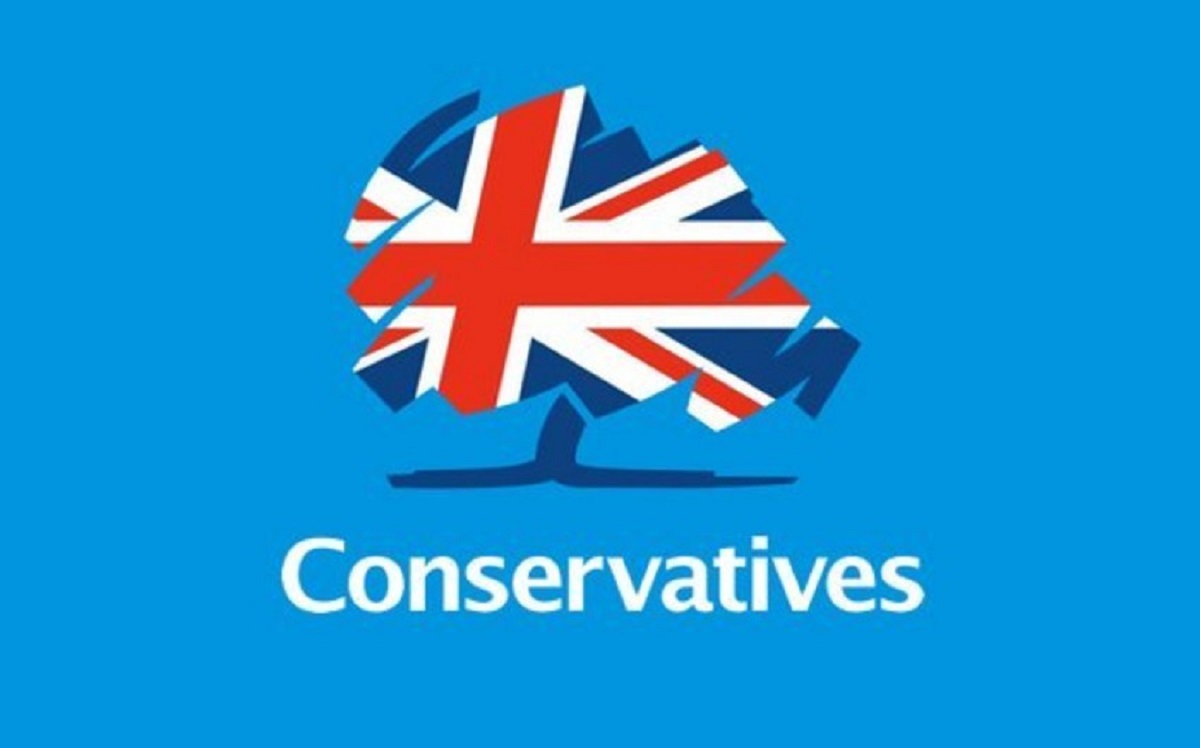
The House of Commons campaign as a symbol of the decline of the Conservatives
By mid-June, the Conservative election campaign was gaining momentum, and the endless hysteria about a third world war that only the Tories can stop was bearing some fruit. Some 54% of Britons feared the outbreak of the next world war within 5-10 years. 67% fear the use of nuclear weapons, which is why the “prepper” movement is growing so rapidly on both sides of the Atlantic, and they are stocking up on food and medical supplies in case of a nuclear apocalypse.
Moreover, 43% of the British state that Russia has an advantage over Ukraine on the battlefield. Although a year ago the figures were quite different, but after the failure of the counteroffensive and Ukraine’s retreats on the front, only 3% of Britons believe that Kiev has an advantage over Russia. This means that faith in a peaceful resolution of the conflict is melting away and alarmism, which benefits the Conservatives, is on the rise.
Militaristic hysteria does not help politicians if the population does not believe. That is why the British Conservatives are heading for a historic defeat. Even the right-wing isolationists from Nigel Farage’s party were actively catching up with them. But they still had to continue to aggravate the situation, because they are unable to offer the electorate something constructive besides populism against the background of crises.
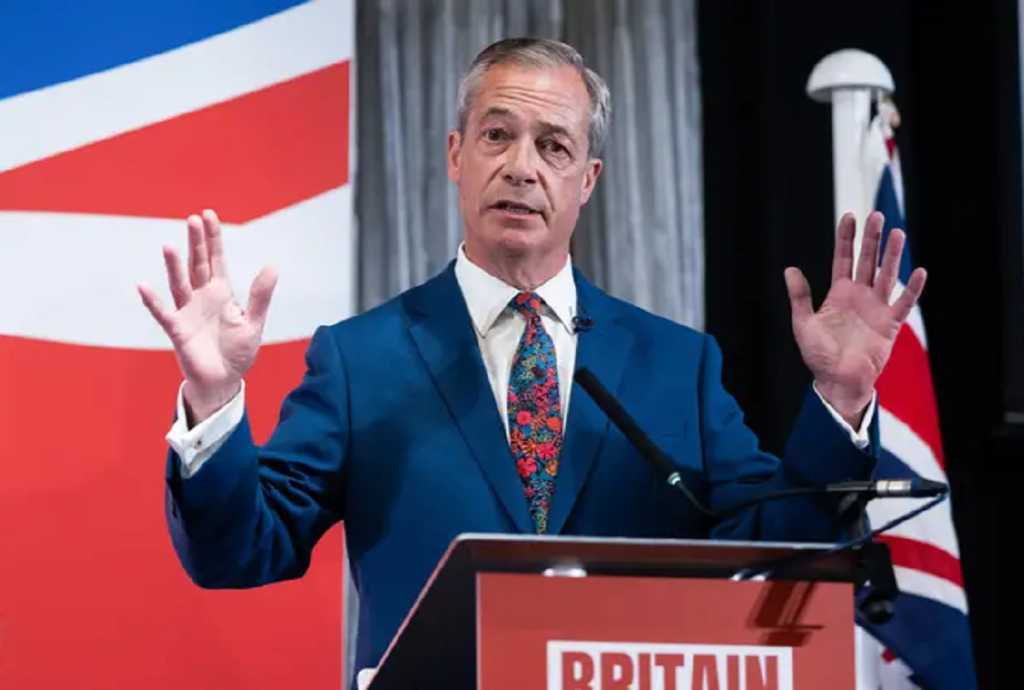
Photo by Thevaultznews.com
The Conservatives were increasingly concerned not so much with fighting Labor, which had long since broken away from them, as with the nationalists of the Reform Party. As soon as the head of the party, Nigel Farage, announced his candidacy for the election, he immediately began to gather masses of people to his rallies which were much more numerous than at the actions of the Conservatives and Labor. Ordered provocateurs also pulled up to these rallies and on the first day of campaigning, Farage had a milkshake thrown in his face. Good thing it didn’t contain anything caustic like acid, and the attacker was a 25-year-old online prostitute calling herself a “miniature blonde and a pocket rocket”. She explicitly declared herself a supporter of ex-Labor leader Jeremy Corbyn, who had been thrown out of the party, so the order was immediately apparent. Corbyn himself is running in London as an independent left-wing candidate and is fighting with Labor. The fact is that for attacking the main Labor leader Keir Starmer, soon to be British Prime Minister, she would have been subjected to a powerful ostracism of all leftists and liberals. So she had to fight with non-systemic right-wingers like Farage, which is safer and forms her image as a “fighter against fascism”. According to official propaganda, it is this imaginary “fascism”, not the invasion of aggressive migrants and the collapse of the economy, which threatens Britain.
“Leftist goofballs” are very useful for the elite in fighting its enemies, and are used as a tool of violence. For example, Antifa, a front group for harassing and attacking right-wing nationalists, also likes to fill alleged milkshakes with quick-setting cement. This can easily be used to assassinate unwanted politicians. However, the attack on Farage only added to his popularity among the right-wing electorate, and he had a good chance of being elected to the House of Commons even in a single-member constituency. Besides, given the current trends, the Reform UK party could well become an ideal spoiler and “bury” the Conservatives as a political force. And then, after the elections, Farage wanted to absorb the Tories and create his own big right-wing project, a kind of “Alternative for Britain”.
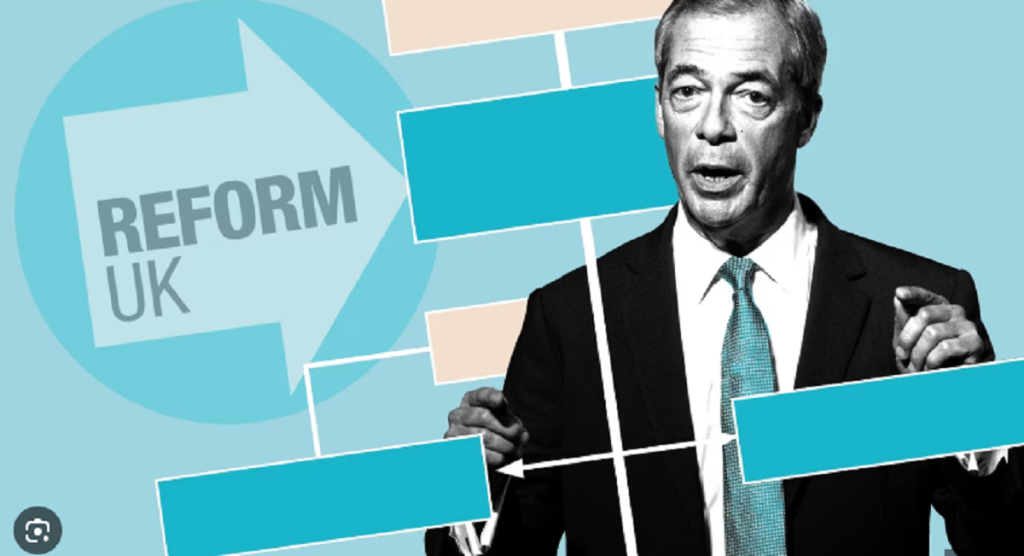
Photo by Financial Times
During the campaign, the Conservatives were no laughing matter. As soon as Nigel Farage burst into the race, his Reform UK party was almost equal to the Tories. In one YouGov poll, the party’s lead over the Conservatives was down to 2 points. At that time, the Tories had already morally resigned themselves to defeat on July 4, but before Farage’s nomination, they hoped at least to maintain an action of 100-150 MPs, with which they could somehow move on in politics and comfortably be in opposition. If the Reform UK party were to surpass the Conservatives in terms of ratings, they would have almost no MPs left to form a significant faction. In the worst case scenario for the Conservatives in the July elections, Labor had a chance of winning 400-500 seats. The second place could be taken not even by them or the nationalists from the Reform UK party, but by the Liberal Democrats with 50-70 deputies.
The Tories, on the other hand, could have only a few dozen seats from 350 mandates, which would have turned them into a midget party. There was a chance that the Reform UK party would come in third place and win 20-30 seats, which would still be a success for them. In the meantime, Rishi Sunak was actively preparing backup options for himself, and planned to promptly give the titles of knights to the head of JPMorgan Jamie Dimon and former Google director Eric Schmidt. The idea was simple and boiled down to giving the right people “sweet gifts” in advance. Because Sunak wanted to go to California right after the election to develop his financial startup in the high-tech sector, and the new “knights” could help him a lot.
Sunak was not interested in the future of the Tories, nor was he interested in the future of Britain. Many “rats” besides him had already run away from the “sinking ship of the Conservative Party”. The Conservatives had 80 MPs resigning in advance, and based on this fact Farage hoped to bring about a complete collapse of the Tories, if not bypassing the party in terms of percentage, then certainly seriously split its electorate.
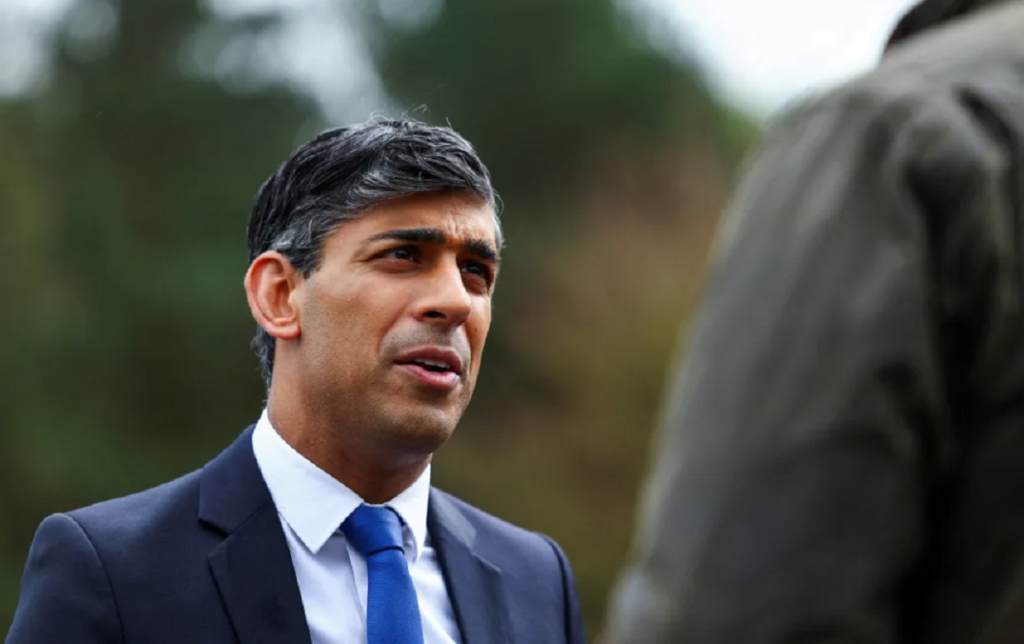
Photo by Rnz.co.nz
The BBC hosted a chaotic debate between representatives of the main British parties on June 8. Expectedly, it was Nigel Farage who came out the strongest. He aggressively criticized Sunak for his decision to leave early from the celebrations in Normandy. He also accused the prime minister of lacking patriotism and respect for veterans. Farage himself had previously raised 100,000 pounds in support of World War II veterans, in this way he tried to break away from the Conservatives age patriotic electorate. And this strategy worked. “Reform UK” party Farage at the time bypassed the Tories in ratings among Britons over 55 years old, and two-thirds of voters considered Rishi’s behavior in Normandy unacceptable. In fact, on the same day as the Normandy landings, hundreds more illegal immigrants landed on British shores by boat. Against this backdrop, Farage stated the decline of the country and called for revolution against both major parties, whose representatives looked dim in the debate.
The Conservatives were represented by Penny Mordaunt, a “transgender” enthusiast who is known to disgust ideological conservatives. Labor was represented by Angela Rayner. Angela Rayner had recently found herself at the center of a scandal when she came to bow to the Muslim diaspora and asked for their electoral support in exchange for a promise to recognize Palestine. Mordaunt accused Labor of wanting to surrender nuclear weapons and capitulate to Russia, and Rayner inactively fought back. However, such demagoguery would not have helped the Conservatives in the elections, and Labor was on its way to victory, even though it was facing a powerful split due to contradictions with the Muslim diaspora. Farage was already preparing to morally destroy and absorb the Tories after the election.
For the Conservatives, the moment of truth came on June 14. For the first time in their two hundred year history, they slipped to third place in the party rankings. At the same time, the Reform UK party broke through its electoral ceiling, with its ratings reaching 19% and the Tories dropping to 17%. This happened just after the Conservatives unveiled their £17 billion tax cut manifesto, which turned out to be the wrong electoral move. Voters didn’t appreciate the silly populism because it would have only exacerbated the crisis with a 120 billion budget deficit. Labor’s approval ratings began to fall, from 47% back in May to 37% in mid-June. They also presented their manifesto with a promise to raise taxes by 8.5 billion pounds on energy and resources companies.
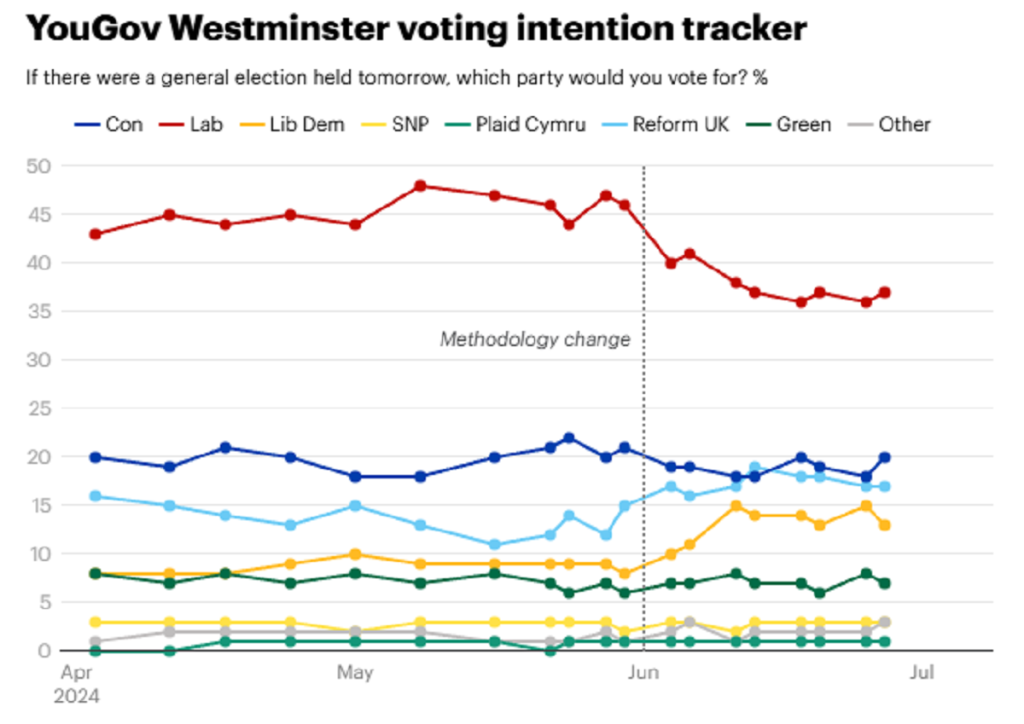
This would finish off the UK’s oil and gas industry, which is already in crisis. Although the decline in their ratings was due to the collapse of a united bloc of left-wing voters from which radical communists and Islamists were splintering. Nigel Farage promoted an isolationist and anti-migrant agenda. He called for increased payments for the birth of a second child and subsequent children, which is very relevant against the background of the demographic crisis. In addition, he proposed reforming the NHS, a system of public health care that is performing poorly.
With 18 days to go until the election, Nigel Farage was already calling himself the real opposition to the future Labor government. His Reform UK party was well on its way to second place in the ratings, ahead of the Conservatives and Liberal Democrats. Electoral models gave Labor about 450 out of 650 seats in the House of Commons during this period, while the Tories were left with only 50-70 seats. This was still a good scenario for them, because if the Reform UK party’s rating had exceeded 20%, which was realistic, it could have picked up many Conservative seats.
Farage predicted the outbreak of a “civil war” within the Conservative party after the election defeat because it would be the ideal scenario for him. After all, Farage is already Britain’s most popular right-wing politician. He would stand a good chance of putting the Tory remnants under his control if the party splits. Many Conservatives are already not against such a development. That is why in their campaigning they are actively posing with pictures of Farage rather than the toxic Rishi Sunak.
Even Grant Shapps, the failed defense minister, was careful not to advertise his Conservative affiliation. By then the Tories were running out of money for the campaign because big business would not donate anything to a party that was certain to lose. It seemed that this was the end of two centuries of Conservative Party history. Labor, on the other hand, is triumphantly coming to power but they too will quickly find themselves in crisis as soon as the electorate realizes that they cannot solve Britain’s problems and the new non-systemic right-wing and left-wing parties have ample opportunity.
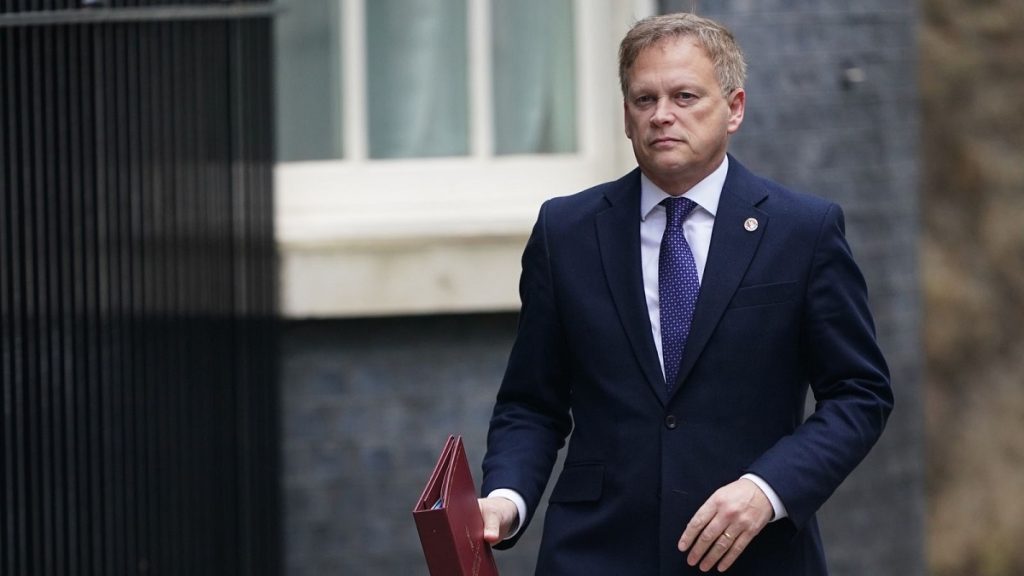
Photo by PA/Sky News
The disintegration of party systems is now taking place in almost all countries in Europe and the United States. Joe Biden, Emmanuel Macron and Rishi Sunak have become “brothers in misfortune”. The latter two made a radical decision to hold early elections, which infuriated even their supporters, and for both of them the outcome of these elections turned out to be extremely unsuccessful.
But more importantly, Britain’s dilapidated two-party system is bursting at the seams. The British divided society, tired of endless crises and crises, increasingly supports non-systemic forces promising to break the status quo. How exactly this status quo was shaken in the July 4 elections in London, we will tell you in the next part of our article.

